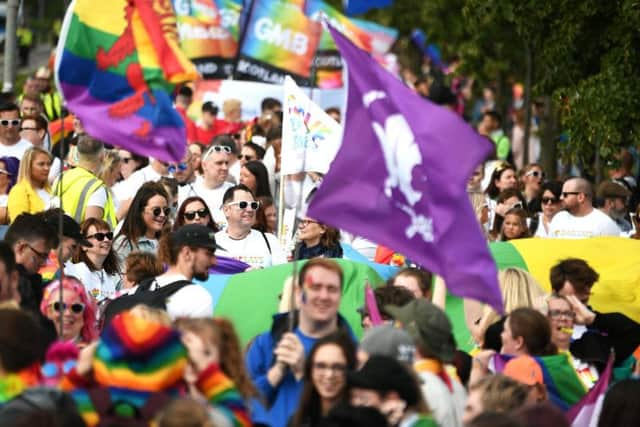What are 'identity politics' and why do they matter in the general election?
Who are you? How do you describe yourself? How do you think about yourself? To which tribe do you belong?
Are you a Leaver or a Remainer? A nationalist or a unionist? Are you Scottish or British or European? Are you "cis" or "trans" or "non-binary"? Are you a boomer or Gen x? Does any of this really matter?
Well it would appear so.
Advertisement
Hide AdAdvertisement
Hide Ad

Politics in the UK has shifted dramatically from people aligning broadly with a political party, perhaps around economic arguments such as "am I happy with paying more tax/do I want to pay less tax/which party will protect my job/my pension" etc, to one where people put the concerns they feel more relevant to their own "identity", be it race, religion, sex, ethnicity, sexual orientation, gender choice, even age group, first and foremost.
Why has this shift happened?
It might all feel a bit metaphysical for those who don't like labels, but the phrase "identity politics" was first coined in the States with the rise of the civil rights movement in the 1960s, and later with feminist and LGBT+ movements through the 70s and 80s.
Politicians realised that appealing to specific groups of voters beyond those traditionally attracted to their parties in more general terms, could swing elections their way. That realisation resulted in parties creating and adopting policies focused specifically on groups who had previously felt marginalised from normal political processes. And as equality was gained by those groups, other marginalised groups too began to demand more from politicians.
Is it a good thing?
As with anything that depends on whether or not you feel you've benefited. Certainly, critics of identity politics say that fundamentally it pits groups against each other, rather than bringing people together in common cause.
Identity politics can also come from the left or the right. It used to be the case that those who put equality for black and ethnic minorities, women, and members of the LGBT community at the heart of their politics were mainly on the left, but as the adoption of equalities laws became accepted by all political hues and therefore more "centrist", other more "fringe" identities began to make themselves felt, and in some cases have proved more polarising.
In the States for instance, there's been a rise of "white identity politics", leading, some commentators would attest to the election of Donald Trump. While in the UK the Brexit vote and the focus on immigration was seen by some as re-energising a right-wing white supremacy movement, which had been dormant.
Then there's the current row over trans rights and women's rights - and whether people who wish to change their gender in law should be allowed to do so because that's how they identify, with women objecting that the impact of such a move on wider society must be debated.
How will it affect the election?
Immigration has become a talking point again during the campaign, with the focus on how either a Tory or Labour government would approach Brexit and the potential ending of freedom of movement. For those who believed the "take back control of our borders" rhetoric of the Leave campaign, then that might trump all other issues. So even if they were more inclined to Labour's economic ideas, for instance, their vote could go Tory or even Brexit party.
Advertisement
Hide AdAdvertisement
Hide AdThe SNP has also put Scottish nationalism front and centre of its election campaign. There is no pretence that "lending" a vote to them will be used as anything other than a mandate for a second independence referendum. If you're a voter who identifies as a Scottish nationalist, then it's a no-brainer. Similarly, such an approach will harden the hearts of those who identify as unionists. Interestingly both sets of voters could be on the same page in terms of social or economic policies. But that will not be enough to bring them together in the polling booth.
The trans issue is also divisive. Many LGBT wings of political parties have declared their support, while women members have been drawing up their own declarations of female rights. There is also much talk on social media of nationalists - men and women - feeling conflicted about their vote. But will their identity as women trump their identity as nationalists? Fitting in one box might not necessarily lead to putting an x in another on a ballot paper.
